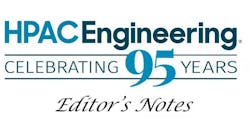Several years ago, Rich Perko, a former colleague, wrote a great article on consolidation in the HVAC industry for HPAC Engineering’s sister publication, Contracting Business. In that article, Rich says HVAC providers and contractors, unless they’re a mega business, will need to find a niche. I understand niche marketing. Before moving to South Florida and becoming a (excuse the expression) consultant, my career was in manufacturing. And nearly all of the products with which I was involved were niche products, such as anaerobic-digester gas-mixing compressors; modular, high-pressure steam generators; and proprietary balancing valves.
So, what niche products are emerging or gaining traction in our industry? Here are three energy-efficiency products I like and have been talking about with clients:
Solar direct-expansion air conditioning. This is not merely solar-assisted air conditioning, whereby photovoltaic panels power fans, although there are some good units out there. This is technology whereby refrigerant is superheated by solar heat captured in an evacuated-tube collector. I know of at least one manufacturer offering both residential and commercial split systems and package units with seasonal energy-efficiency ratios (SEER) reportedly as high as 37.5. And I’ve personally seen an independent engineer’s report confirming 31.5 SEER on a 5-ton unit installed in a professional office.
Floating high- (head-) pressure control for air-cooled chillers. This is a bolt-on, pre-engineered energy-retrofit solution for most existing air-cooled chillers, regardless of manufacturer. As I learned during a recent HPAC Engineering Webinar (to view the Webinar, click here), it’s designed to optimize energy efficiency using technology that incorporates floating high-pressure control and variable-speed-drive fan operation. According to the manufacturer, the solution can reduce an air-cooled chiller’s energy consumption by 20 to 30 percent.
Liquid-desiccant dehumidification. I became acquainted with this technology, which has been around since the 1930s, in 2007, when it was being imported from Israel. Today, several models of packaged equipment capable of being powered by the grid and/or renewable energy sources are being sold. The concept is simple: Instead of solid desiccant, the equipment uses a concentrated brine solution, which has a high affinity for water and naturally absorbs moisture from air. Applications include dedicated outdoor-air systems, high-latent-load environments, and critical dew-point control. Energy savings of 30 to 60 percent over desiccant-wheel systems are claimed.
While attending POWER-GEN International in Orlando, Fla., recently, I had the opportunity to speak with Tim Pickett, chief executive officer of Frontier Water Systems. He’s developed technology providing high-rate extraction of selenium, nitrate, arsenic, and mercury from groundwater in mining operations and flue-gas desulfurization blowdown from power generation. The process uses a naturally occurring (but accelerated) bacteria to transform toxic, soluble contaminants to a solid, non-hazardous product that can be handled and disposed of safely. His equipment is modular and designed to be transported over the road and dropped on a concrete pad. He claims it will save the power-generation and mining industries hundreds of millions of dollars while providing clean water to our lakes and rivers. This product does nothing specifically for the HVAC industry, but much for sustainability.
Niche marketing isn’t just about the product; it’s also about the market. Innovation makes the difference.








